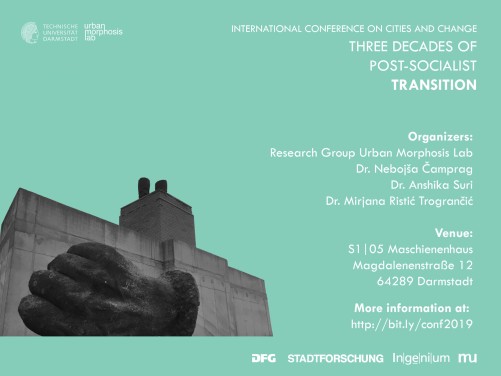Three Decades of Post Socialist Transition
International Conference on Cities and Change, May 17-18, 2019
18.02.2019
After the collapse of state socialism in Central and Eastern Europe (CEE), the former socialist countries’ inclusion into the competitive global economies advanced as both; temporally and spatially uneven processes. These uneven processes presented myriad diversities, thereby implying significant shifts and high levels of creativity in finding ways of adapting to new forms of socio-political realities, which in turn offered a multitude of opportunities for urban research.
Subsequently, scholarly attention has been paid particularly on examining interconnections between historical-, sociological-, and market-related aspects of transitioning processes. However, the exact implications of their spatial transformations have been largely absent within systematic research. Contrary to the often more adaptable socio-political structures of cities, built urban environment requires more time to adapt to changes and consequently reflect the new ideological concepts. This thereby warrants thirty years of comprehensive transition (1989-2019) as an optimum point of departure for undertaking a thorough and in-depth reflection. Hence, the international conference “Three Decades of Post-socialist Transition” seeks to bring together leading urban academics to discuss issues of post-socialist transition and a multitude of its effects on built urban environment from diverse perspectives. In addition, we also aim to challenge and advance both our knowledge and practice around the complex links within the neoliberal development agenda, socio-political changes, post-socialist identity formation, representation of cities and the urban space.
Conference venue
TU Darmstadt
Campus Stadtmitte
Maschinenhaus S1|05
Magdalenenstraße 12
64289 Darmstadt, Germany
Registration info
The registration is already closed.
Conference programme
DAY 1: Friday, 17.05.2019
- 08:45-09:30 Reception and registration
- 09:30-09:45 Opening remarks and welcome address
- 09:45-10:45 Inaugural lecture: Prof. Dr. Oleg Golubchikov
- 10:45-11:00 Break
- 11:00-12:40 Parallel Sessions I
Session 1: How Long Does The ‘Post’ Last? Spatial Dynamics in Post-Socialist Transition
Session 2A: Socialist Legacy–Emerging Heritage?
Session 3B: The Urban Morphology of Post Socialism
- 12:40-13:40 Lunch break
- 13:40-15:00 Parallel Sessions II
Session 2B: Socialist Legacy–Emerging Heritage?
Session 3B: The Urban Morphology of Post Socialism
Session 4A: Contested functions of (socialist) architecture in post-socialist cities
- 15:00-15:15 Coffee Break
- 15:15-17:05 Parallel Sessions III
Session 4B: Contested functions of (socialist) architecture in post-socialist cities
Session 5A: 1989-2019 CEE urban transformation revisited: city visions, self-made transitions and alternative development models
Session 6: Culture-led urban transformation and tourism potential in post-socialist Europe and beyond
- 17:05-17:20 Break
- 17:20-18:20 Closing Lecture: Prof. Dr. Nina Gribat
DAY 2: Saturday, 18.05.2019
- 09:00-09:45 Registration
- 09:45-10:45 Opening Lecture: Prof. Dr. Kaliopa Dimitrovska Andrews
- 10:45-11:00 Break
- 11:00-12:40 Parallel Sessions IV
Session 5B: 1989-2019 CEE urban transformation revisited: city visions, self-made transitions and alternative development models
Session 7: Contentious Mobility Governance: Mobility as an entry point to understanding urban governance in post-socialist cities
Session 8: Rural Areas in the Post-Socialist Context - 12:40-13:40 Lunch break
- 13:40-15:00 Parallel Sessions V
Session 9: New patterns of land appropriation in post-socialist space
Session 10: Innovating the Post-socialist City: Challenging Legacy. Emerging Fears?
Session 11: Promises of Strategic Urban Planning
- 15:00-15:15 Coffee Break
- 15:15-16:15 Closing Lecture: Dr. Luděk Sýkora
- 16:15-16:30 Break
- 16:30-17:30 Plenary session
- 17:30-18:00 Closing remarks and conference summation
Keynote speakers
- Prof. Dr. Annette Rudolph-Cleff, TUD
- Prof. Dr. Oleg Golubchikov, Cardiff University, UK
- Prof. Dr. Kaliopa Dimitrovska Anrews, Univ. of Ljubljana, Slovenia
- Prof. Dr. Nina Gribat, TUD
- Prof. Dr. Luděk Sýkora, Charles University, Prague, Czech Republic
- Prof. Dr. Sybille Frank, TUD
Conference sessions
1. How Long Does The ‘Post’ Last? Spatial Dynamics in Post-Socialist Transition
2. Socialist Legacy–Emerging Heritage?
3. The Urban Morphology of Post Socialism
4. Contested Functions of (Socialist) Architecture in Post-socialist Cities
5. City Visions, Self-made Transitions and Alternative Development Models
6. Culture-led Urban Transformation and Tourism Potential in Post-socialist Europe
7. Mobility as an Entry Point to Understanding Urban Governance
8. Rural Areas in the Post-Socialist Context
9. New Patterns of Land Appropriation in Post-socialist Space
10. Innovating the Post-socialist City: Challenging Legacy. Emerging Fears?
11. Promises of Strategic Urban Planning
Organisation team and partners
Urban Morphosis Lab is a research lab established in 2018, based at the Department of Architecture in TU Darmstadt and places its focus on investigating complexity and diversity in contemporary urban changes. The Lab aims to provide a a research platform for investigating diverse phenomena in urban change, and fostering connections between international researchers with similar research foci, thereby enabling networks that can provide more comprehensive knowledge.
The organizing team
Dr. Nebojša Čamprag
Dr. Mirjana Ristić Trogrančić
Dr. Anshika Suri
Supported by
- The DFG (Deutsche Forschungsgemeinschaft)
- AG Stadtforschung
- Ingenium – Young Researchers at TU Darmstadt
- MSc. Programme “International Cooperation in Urban Development – Mundus Urbano”
For more info visit:




